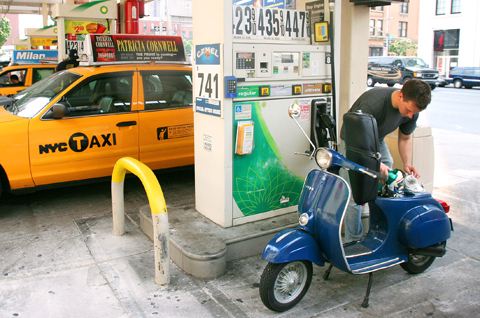The average price of regular gas crept up to US$4 a gallon (3.8 liters) in the US for the first time over the weekend, passing the once-unthinkable milestone just in time for the peak summer travel season.
Prices at the pump are expected to keep climbing, especially after last week’s furious surge in oil prices, which neared US$140 a barrel in a record-shattering rally on Friday.
While Americans who have to drive will feel the biggest squeeze, the increased prices also translate into higher costs for consumers and businesses, who will be forced to shoulder increased transportation costs of food and anything else that needs to be transported.

PHOTO: AP
Gas prices rolled past their latest threshold on Sunday, increasing to US$4.005 overnight from US$3.988 a gallon the day before, the American Automobile Association and the Oil Price Information Service said.
Of course, drivers in many parts of the country have already been paying well above that price for some time.
California has seen some of the highest prices; a gallon there now averages US$4.436, the most in the country.
Missourians are paying the least at the pump, with a gallon in the Show-Me State selling for a relatively cheap US$3.802.
Truckers and others with diesel engines under the hood have it even worse off. A gallon of diesel now sells for US$4.762, up nearly US$0.01 overnight. Prices hit a record atop US$4.79 at the end of last month.
Skyrocketing oil prices are largely to blame for the surge.
Soaring demand in Asia and elsewhere ensures global supplies remain tight even as Americans cut back; recent figures from the US Energy Department’s Energy Information Administration showed US gasoline demand actually fell 1.4 percent over the last four weeks.
Crude prices shot up more than 13 percent late last week in their biggest two-day price gain in history. Benchmark light, sweet crude for next month’s delivery officially finished the week at US$138.54 on the New York Mercantile Exchange, but at one point jumped as high as US$139.12.
The eye-popping prices are leading many motorists to rein in their gas consumption, either by cutting back on all but the most essential driving or looking anew at alternatives like public transportation.
Sales of gas-guzzling vans and sport-utility vehicles are down in the US, while those of fuel-efficient compacts and hybrids are on the rise.

MORE VISITORS: The Tourism Administration said that it is seeing positive prospects in its efforts to expand the tourism market in North America and Europe Taiwan has been ranked as the cheapest place in the world to travel to this year, based on a list recommended by NerdWallet. The San Francisco-based personal finance company said that Taiwan topped the list of 16 nations it chose for budget travelers because US tourists do not need visas and travelers can easily have a good meal for less than US$10. A bus ride in Taipei costs just under US$0.50, while subway rides start at US$0.60, the firm said, adding that public transportation in Taiwan is easy to navigate. The firm also called Taiwan a “food lover’s paradise,” citing inexpensive breakfast stalls

TRADE: A mandatory declaration of origin for manufactured goods bound for the US is to take effect on May 7 to block China from exploiting Taiwan’s trade channels All products manufactured in Taiwan and exported to the US must include a signed declaration of origin starting on May 7, the Bureau of Foreign Trade announced yesterday. US President Donald Trump on April 2 imposed a 32 percent tariff on imports from Taiwan, but one week later announced a 90-day pause on its implementation. However, a universal 10 percent tariff was immediately applied to most imports from around the world. On April 12, the Trump administration further exempted computers, smartphones and semiconductors from the new tariffs. In response, President William Lai’s (賴清德) administration has introduced a series of countermeasures to support affected

CROSS-STRAIT: The vast majority of Taiwanese support maintaining the ‘status quo,’ while concern is rising about Beijing’s influence operations More than eight out of 10 Taiwanese reject Beijing’s “one country, two systems” framework for cross-strait relations, according to a survey released by the Mainland Affairs Council (MAC) on Thursday. The MAC’s latest quarterly survey found that 84.4 percent of respondents opposed Beijing’s “one country, two systems” formula for handling cross-strait relations — a figure consistent with past polling. Over the past three years, opposition to the framework has remained high, ranging from a low of 83.6 percent in April 2023 to a peak of 89.6 percent in April last year. In the most recent poll, 82.5 percent also rejected China’s

PLUGGING HOLES: The amendments would bring the legislation in line with systems found in other countries such as Japan and the US, Legislator Chen Kuan-ting said Democratic Progressive Party (DPP) Legislator Chen Kuan-ting (陳冠廷) has proposed amending national security legislation amid a spate of espionage cases. Potential gaps in security vetting procedures for personnel with access to sensitive information prompted him to propose the amendments, which would introduce changes to Article 14 of the Classified National Security Information Protection Act (國家機密保護法), Chen said yesterday. The proposal, which aims to enhance interagency vetting procedures and reduce the risk of classified information leaks, would establish a comprehensive security clearance system in Taiwan, he said. The amendment would require character and loyalty checks for civil servants and intelligence personnel prior to